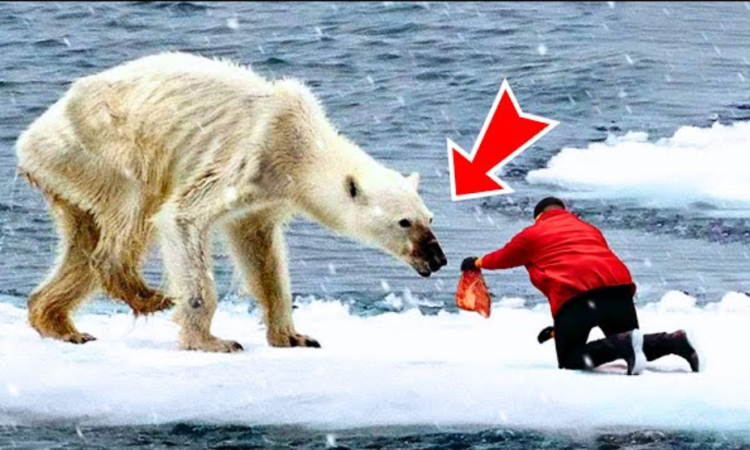
One afternoon in April, in a remote village in the Kamchatka region, word spread of unusual sightings on the coast. The villagers were stunned by what they saw. It was a wild polar bear, the likes of which none of them had ever seen before. But how had it gotten there? Normally, these animals live in the Arctic, hundreds of kilometers away.
The story was interesting. One day, when the animal was foraging for food, a sheet of ice must have broken away from the mainland where the polar bear was. The animal probably tried to get back to land but couldn’t risk it because it was surrounded by ice and water. This was the start of a life-changing adventure for the young predator.
After a few days, or even a few weeks, he arrived in a strange land, very different from what he knew. The animal was 700 kilometers from home, so when he arrived in the village and stood on the shore, all he could think about was food. The polar bear tried to dig for food, but every attempt ended in failure. Not only was the land unfamiliar, but it was also unusually hot, and suitable food was scarce.
The polar bear wandered around but initially avoided approaching the village. His sharp ears picked up the distant sounds of people going about their daily business. Normally, other bears stay away from human settlements, but this bear was hungry and tired. It might not have been wise to approach the village, but hunger spurred him on. A nearby building caught his attention, and he walked towards it.
The predator, of course, did not know that this was the village police station. He was lying there, weak and tired from his long journey, with a sad and desperate expression on his face, as if asking for help. It didn’t take long for the local police to notice their unusual visitor. One of the officers raised the alarm, and two officers were dispatched to take a closer look at the animal.
The polar bear was gigantic in size. It had white fur and clearly visible sharp claws. Naturally, they were afraid to get any closer. The policemen approached cautiously to get a better view of the animal but kept their distance so as not to frighten it. When the anxious officers finally realized what the animal was, they were shocked. There in the snow was a large and intimidating young male polar bear that had mysteriously landed in their small village. They couldn’t believe their eyes, but they also realized that something was wrong with their unexpected visitor.
The animal appeared to have a serious injury to its front paw. The polar bear was lying there with its injured paw pressed against its body. The police officers felt sorry for the animal and decided to help it. They contacted the local wildlife protection authorities. The officers were shocked to hear about this unusual case and set off as quickly as possible. They took care of the polar bear’s paw and gave it a rest.
The bear, called “Umka” by the locals, became a celebrity in the village. Although the bear ate very little, the villagers brought him plenty of fish and food every day. Although happy for the people’s help, it was clear that the bear wanted to return home. His return became a sensation, even attracting visitors from neighboring villages. The police kept a close eye on the bear and were careful not to let anyone get too close while they considered a solution.
Experts were consulted and came to the conclusion that Umka had no chance of survival in Kamchatka and needed to return home urgently. But how was this to be done? The animal was so disoriented that it could never find its way back on its own. Even if the polar bear knew the way, the journey would be illogical for the animal and it would not make it. The situation looked hopeless.
Vladimir Guardian Ko, head of the State Hunting Supervision Department and the Regional Forestry and Wildlife Protection Agency, explained that the return was not an isolated case. Polar bears sometimes wander away from their homes on ice floes when the ice sheets unexpectedly break away from the mainland. Unfortunately, they are often unable to return home or find food in their new environment. Therefore, for guests like Umka, it is very likely that they will die after this involuntary relocation. But humans were not going to let this happen. They had to find a way to help the polar bear.
News of the unusual visitor spread quickly, and many people followed with interest how his condition developed. Within a few days, measures were taken to return the predator to its true home in the Arctic. The regional Governor Vladimir Ilyich’s office asked Emergency Minister Yevgeny Chef to provide a helicopter to take Umka back to his Arctic habitat. Also, as the official Sergei noted, a special transport cage was built for the animal.
Eight days after Umka’s arrival, the Russian Emergencies Ministry organized air rescue operations to take Umka back to the icy Arctic. Never before had a creature of gigantic proportions been transported by helicopter in such a way. Everyone involved was therefore in great difficulty. Still, people were determined to carry out this rescue operation.
When they arrived in Kamchatka, experts temporarily put the bear to sleep so that it could survive the flight. Alexander Schell, a wildlife advisor in Kamchatka, reported that the bear was healthy and well-fed. The anesthetized animal was then placed in a specially made cage and loaded into the helicopter. Villagers cheered as the authorities took off with Umka. But no one could have predicted what would happen during the flight.
It was a long journey, and the crew members were nervous because suddenly something unexpected happened. They heard a noise in the cage. The polar bear woke up. Everyone was alert; they didn’t want to scare the animal with sudden movements. The crew’s anxiety was great. They were afraid that the animal would try to tear the cage apart or shake the helicopter during the 700-kilometer flight. This could have jeopardized the entire mission and endangered the lives of everyone on board.
Fortunately, the bear seemed to understand that people wanted to help it and remained calm in its cage, watching them with its eyes. It was conscious during the flight but did not shake the cage or make any attacks. A spokesperson for the Kamchatka regional government told the press that it was noisy and Umka was scared, but remained calm. He was a very brave bear.
The flight went smoothly until they reached the place where Umka was to be released. After landing, they opened the cage. Umka was encouraged to come out. The bear hesitated for a moment and then started running into the wild. The mission was a great success, and Umka was finally back home.




